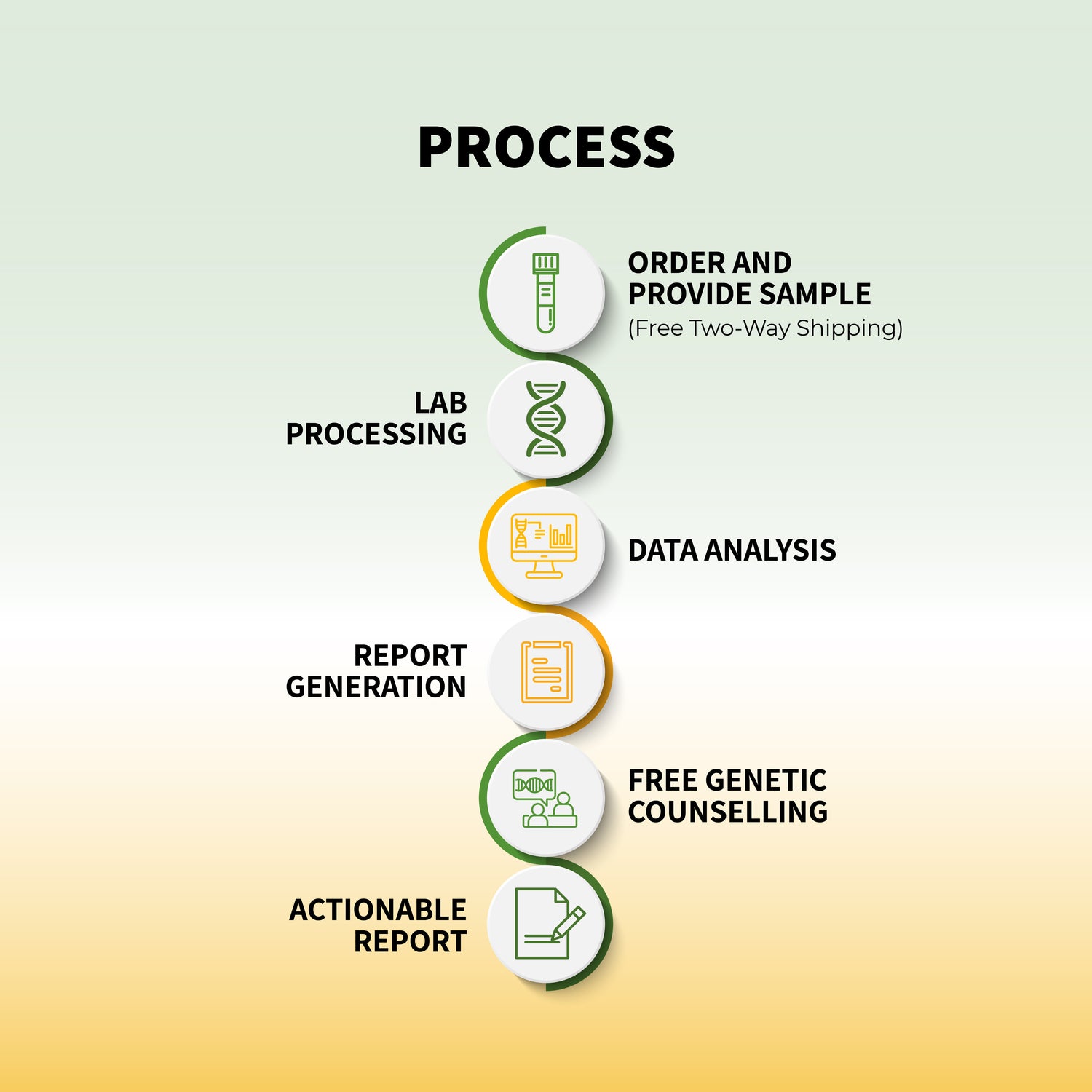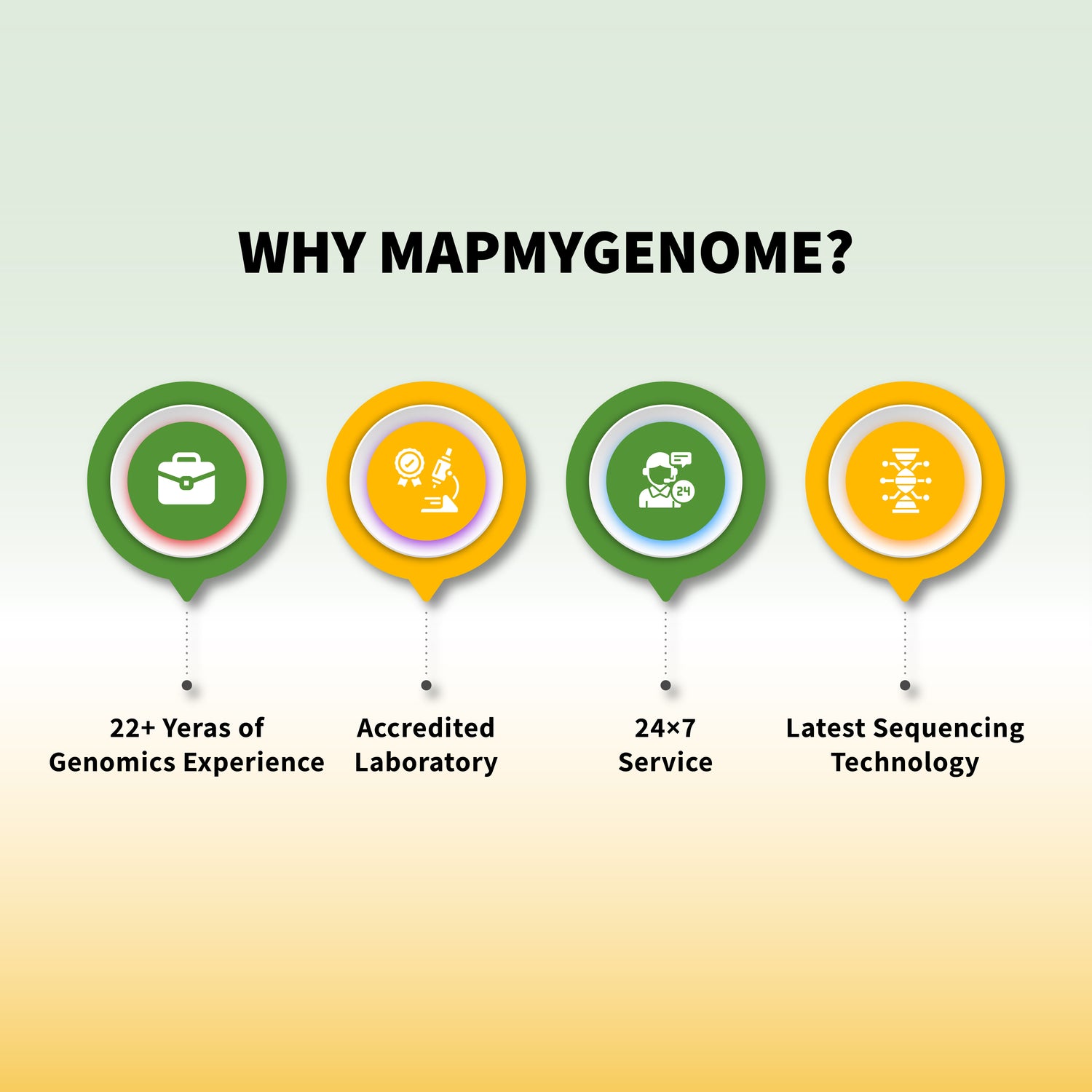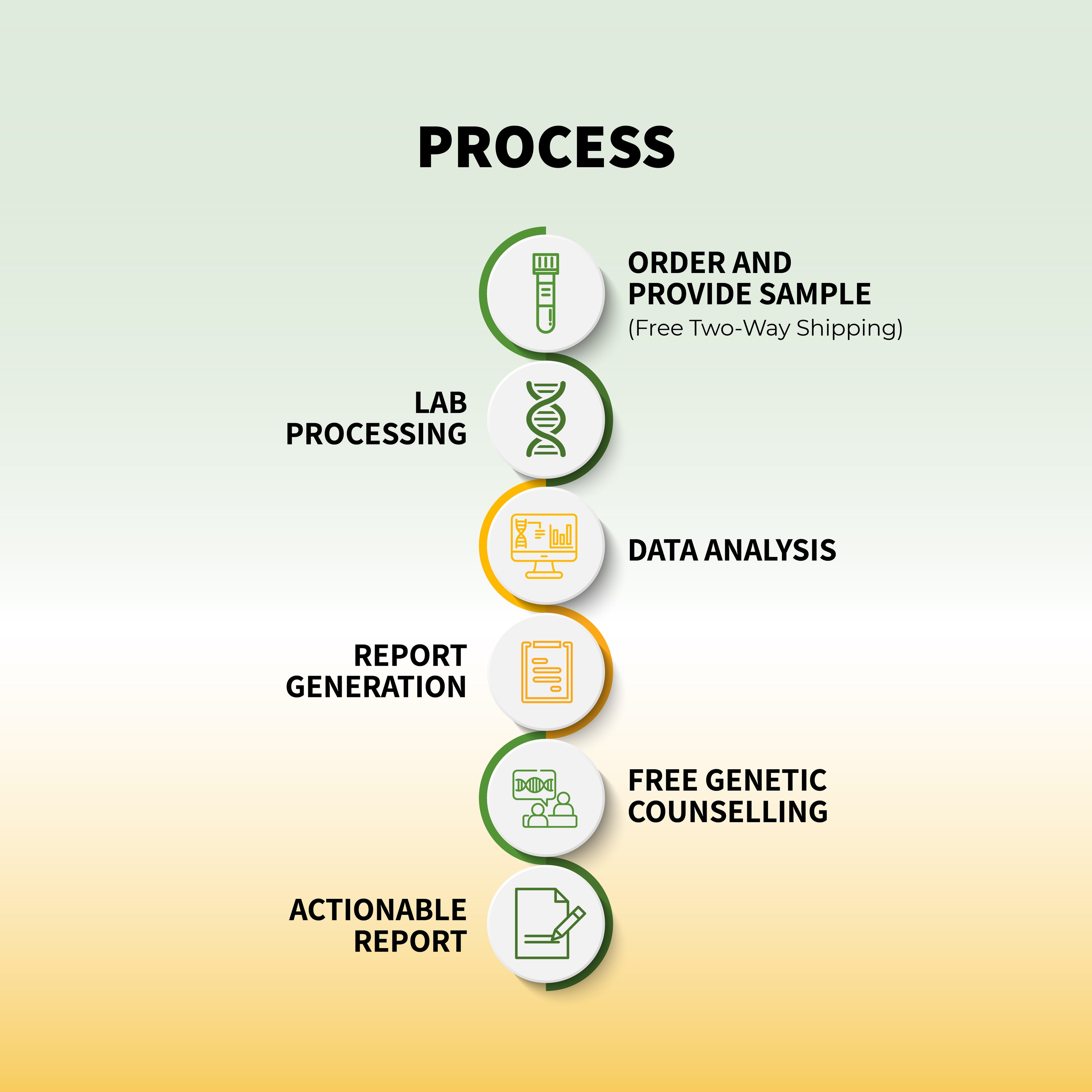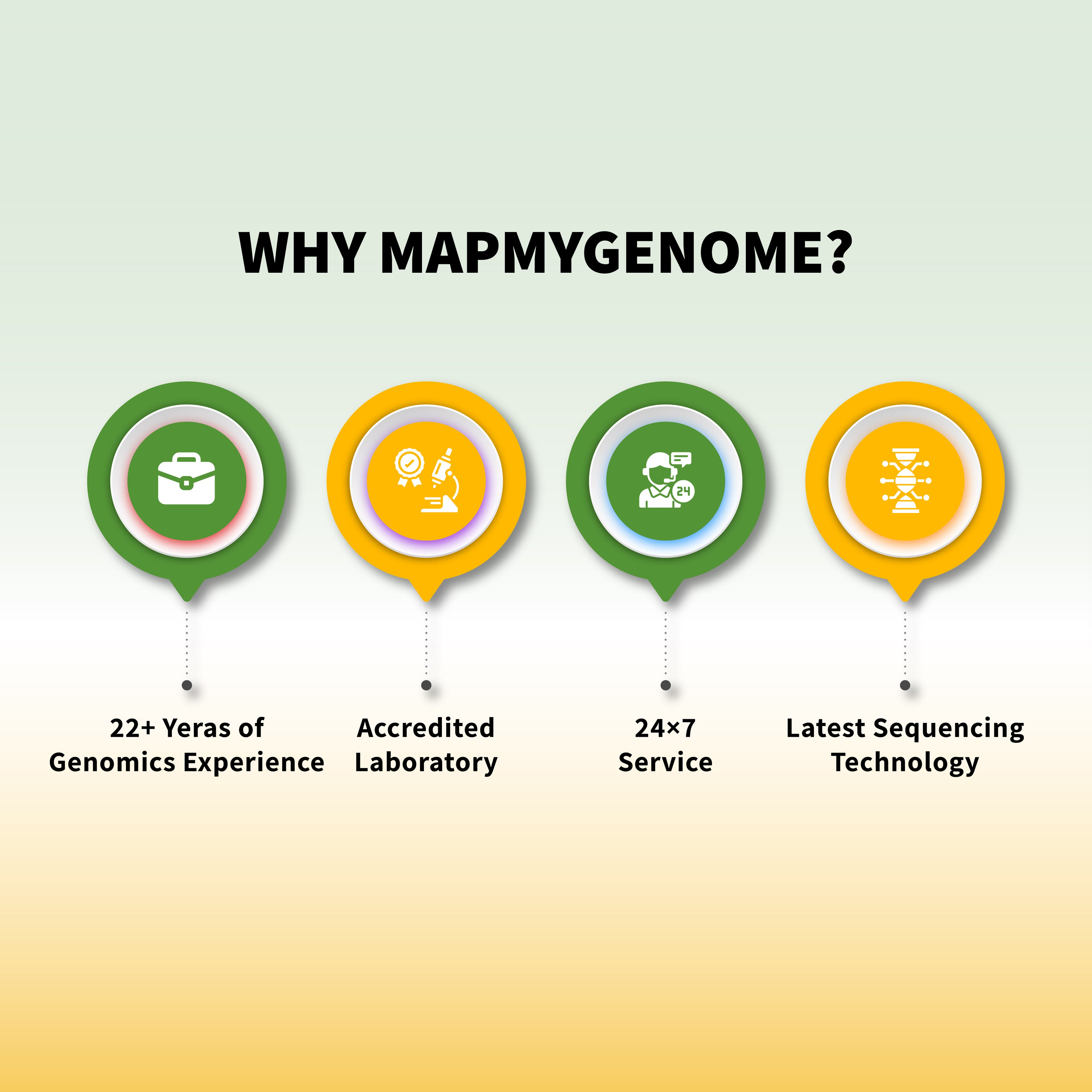मानसिक स्वास्थ्य समग्र स्वास्थ्य की आधारशिला है, फिर भी अवसाद और चिंता जैसी स्थितियों को अक्सर गलत समझा जाता है और कलंकित माना जाता है। विज्ञान में हाल ही में हुई प्रगति, विशेष रूप से डीएनए परीक्षण, इस बारे में नई जानकारी प्रदान करते हैं कि आनुवंशिकी हमारे मानसिक स्वास्थ्य को कैसे आकार दे सकती है। अगर आपने कभी सोचा है कि क्या चिंता या अवसाद से जूझना आपके जीन से जुड़ा हो सकता है, तो आप अकेले नहीं हैं। आइए आनुवंशिकी और मानसिक स्वास्थ्य के बीच के आकर्षक संबंध में गोता लगाएँ और जानें कि मानसिक स्वास्थ्य डीएनए परीक्षण आपको बेहतर देखभाल की ओर कैसे मार्गदर्शन कर सकता है।
मानसिक स्वास्थ्य की आनुवंशिकी को समझना
जीन मानसिक स्वास्थ्य को कैसे प्रभावित करते हैं?
जीन हमारे स्वास्थ्य के कई पहलुओं में महत्वपूर्ण भूमिका निभाते हैं, जिसमें मानसिक स्वास्थ्य भी शामिल है। विशिष्ट जीन मस्तिष्क रसायन विज्ञान, हार्मोनल विनियमन और तनाव के प्रति हमारी प्रतिक्रिया को प्रभावित कर सकते हैं। उदाहरण के लिए:
- अवसाद के प्रति आनुवंशिक प्रवृत्ति: 5-HTTLPR जैसे जीनों में परिवर्तन सेरोटोनिन के स्तर को प्रभावित कर सकता है, जो कि मनोदशा विनियमन से निकटतापूर्वक जुड़ा हुआ है।
- चिंता जोखिम जीन: डोपामाइन और कॉर्टिसोल प्रतिक्रियाओं से संबंधित जीनों में बहुरूपता चिंता संवेदनशीलता को बढ़ा सकती है।
यह सिर्फ जीन के बारे में नहीं है
हालांकि आनुवंशिकी इसकी भूमिका तय करती है, लेकिन पर्यावरण और जीवनशैली जैसे अन्य कारक भी महत्वपूर्ण भूमिका निभाते हैं। उदाहरण के लिए:
- तनावपूर्ण जीवन की घटनाएं या आघात आनुवंशिक कमजोरियों को सक्रिय कर सकते हैं।
- व्यायाम और सजगता जैसी स्वस्थ आदतें कुछ आनुवंशिक जोखिमों का प्रतिकार कर सकती हैं।
मानसिक स्वास्थ्य डीएनए परीक्षण: यह क्या है?
मानसिक स्वास्थ्य डीएनए परीक्षण से क्या पता चल सकता है?
मानसिक स्वास्थ्य डीएनए परीक्षण मूड विकारों, चिंता और अन्य स्थितियों से जुड़े विशिष्ट जीन का विश्लेषण करता है। यह परीक्षण निम्नलिखित के बारे में जानकारी प्रदान कर सकता है:
- अवसाद और चिंता के प्रति आपकी आनुवंशिक प्रवृत्ति।
- इन स्थितियों के उपचार के लिए प्रयुक्त दवाओं के प्रति आपके शरीर की प्रतिक्रिया ।
- पोषण और जीवनशैली संबंधी कारक जो मानसिक स्वास्थ्य को बढ़ावा दे सकते हैं।
यह परीक्षण कैसे काम करता है?
- चरण 1: घर पर ही डीएनए परीक्षण किट मंगवाएं या किसी पेशेवर क्लिनिक में जाएं।
- चरण 2: लार का नमूना प्रदान करें।
- चरण 3: कार्यान्वयन योग्य जानकारी के साथ अपनी व्यक्तिगत आनुवंशिक रिपोर्ट प्राप्त करें।
मानसिक स्वास्थ्य के लिए आनुवंशिक परीक्षण क्यों महत्वपूर्ण है
अपने आनुवंशिक जोखिमों को जानने के लाभ
-
व्यक्तिगत देखभाल योजनाएँ
जेनेटिक परीक्षण डॉक्टरों को आपके अद्वितीय डीएनए के आधार पर उपचार तैयार करने की अनुमति देता है। उदाहरण के लिए, यह उन दवाओं की पहचान कर सकता है जो आपके लिए सबसे प्रभावी हैं, जिससे परीक्षण-और-त्रुटि प्रक्रिया कम हो जाती है। -
सक्रिय हस्तक्षेप
अवसाद या चिंता के प्रति अपनी आनुवंशिक प्रवृत्ति को जानने से आप निवारक उपाय करने में सक्षम हो जाते हैं, जैसे चिकित्सा, तनाव प्रबंधन, या जीवनशैली में परिवर्तन। -
पारिवारिक अंतर्दृष्टि
आपकी आनुवंशिक प्रोफ़ाइल को समझने से आपके परिवार के सदस्यों को अपने मानसिक स्वास्थ्य के बारे में निर्णय लेने में मदद मिल सकती है।
कलंक को तोड़ना
डीएनए परीक्षण से पता चलता है कि मानसिक स्वास्थ्य संबंधी समस्याएं अक्सर जैविक कारणों से होती हैं, न कि व्यक्तिगत कमज़ोरियों से। यह दृष्टिकोण अधिक समझ और करुणा को बढ़ावा दे सकता है।
शोध से प्राप्त महत्वपूर्ण जानकारी
अवसाद और सेरोटोनिन ट्रांसपोर्टर जीन
अध्ययनों से पता चलता है कि 5-HTTLPR जीन के कुछ रूपों वाले व्यक्तियों में अवसाद का खतरा बढ़ सकता है, विशेष रूप से जब वे दीर्घकालिक तनाव के संपर्क में आते हैं।
चिंता और कॉर्टिसोल संवेदनशीलता
एचपीए अक्ष (शरीर की तनाव-प्रतिक्रिया प्रणाली) से संबंधित जीनों में परिवर्तन को बढ़ी हुई चिंता और तनाव प्रबंधन में कठिनाई से जोड़ा गया है।
दवा प्रतिक्रियाशीलता
फार्माकोजेनोमिक्स (फार्माकोजेनोमिक्स) में यह अध्ययन किया गया है कि जीन किस प्रकार औषधि प्रतिक्रिया को प्रभावित करते हैं, तथा इससे यह पता चला है कि कुछ अवसादरोधी दवाएं कुछ लोगों पर दूसरों की तुलना में बेहतर क्यों काम करती हैं।
बेहतर मानसिक स्वास्थ्य के लिए कार्रवाई योग्य कदम
डीएनए परीक्षण के बाद की सिफारिशें
- आनुवंशिक परामर्शदाता से परामर्श करें: एक पेशेवर आपके परिणामों की व्याख्या करने और उनके निहितार्थों को समझने में आपकी सहायता कर सकता है।
- समग्र दृष्टिकोण अपनाएं: अपनी अंतर्दृष्टि का उपयोग करके एक व्यापक कल्याण योजना बनाएं जिसमें चिकित्सा, आहार और तनाव प्रबंधन शामिल हो।
- अपने मानसिक स्वास्थ्य की निगरानी करें: मानसिक स्वास्थ्य पेशेवर के साथ नियमित जांच आपकी प्रगति पर नज़र रखने और आवश्यकतानुसार रणनीतियों को समायोजित करने में मदद कर सकती है।
आनुवंशिक अंतर्दृष्टि पर आधारित जीवनशैली संबंधी सुझाव
- यदि आप चिंताग्रस्त रहते हैं, तो अपनी दिनचर्या में योग या ध्यान जैसे अभ्यासों को शामिल करें।
- जिन लोगों में अवसाद की आनुवंशिक प्रवृत्ति है, उन्हें मस्तिष्क के स्वास्थ्य को बेहतर बनाने के लिए सैल्मन और अखरोट जैसे ओमेगा-3 फैटी एसिड से भरपूर खाद्य पदार्थों को प्राथमिकता देनी चाहिए।
मानसिक स्वास्थ्य में डीएनए परीक्षण की भूमिका के बारे में अक्सर पूछे जाने वाले प्रश्न
1. क्या डीएनए परीक्षण मानसिक स्वास्थ्य विकारों को ठीक कर सकता है?
नहीं, डीएनए परीक्षण मानसिक स्वास्थ्य स्थितियों का इलाज नहीं कर सकता। यह ऐसी जानकारी प्रदान करता है जो अधिक प्रभावी उपचार और निवारक उपायों का मार्गदर्शन कर सकती है।
2. मानसिक स्वास्थ्य डीएनए परीक्षण पर किसे विचार करना चाहिए?
जिन लोगों के परिवार में मानसिक स्वास्थ्य संबंधी समस्याओं का इतिहास रहा है, या जो प्रभावी उपचार पाने के लिए संघर्ष कर रहे हैं, उन्हें आनुवंशिक परीक्षण से लाभ हो सकता है।
3. क्या परीक्षण सटीक है?
हालांकि कोई भी परीक्षण 100% सटीक नहीं होता, लेकिन मानसिक स्वास्थ्य डीएनए परीक्षण मजबूत वैज्ञानिक शोध पर आधारित होते हैं। विस्तृत विश्लेषण के लिए स्वास्थ्य सेवा पेशेवरों से परामर्श लें।
4. क्या मेरे परिणाम मेरे बीमा को प्रभावित करेंगे?
कई देशों में आनुवंशिक गोपनीयता कानून, जैसे कि अमेरिकी आनुवंशिक सूचना गैर-भेदभाव अधिनियम (GINA), आनुवंशिक डेटा के आधार पर भेदभाव से सुरक्षा प्रदान करते हैं।
5. क्या कोई नैतिक चिंताएं हैं?
हां, डीएनए परीक्षण का जिम्मेदारी से उपयोग करना, डेटा गोपनीयता सुनिश्चित करना और आनुवंशिक जानकारी के दुरुपयोग से बचना महत्वपूर्ण है।
निष्कर्ष
डीएनए परीक्षण मानसिक स्वास्थ्य देखभाल में क्रांति ला रहा है, जो अवसाद और चिंता के पीछे आनुवंशिक कारकों में व्यक्तिगत अंतर्दृष्टि प्रदान करता है। जबकि आनुवंशिकी मानसिक स्वास्थ्य का एकमात्र निर्धारक नहीं है, आपकी प्रवृत्तियों को समझने से आपको स्वस्थ भविष्य की ओर सक्रिय, सूचित कदम उठाने में मदद मिल सकती है। चाहे थेरेपी, दवा या जीवनशैली में बदलाव के माध्यम से, मानसिक स्वास्थ्य डीएनए परीक्षण से प्राप्त ज्ञान आपको अपने स्वास्थ्य पर नियंत्रण हासिल करने में सक्षम बनाता है।
आज ही पहला कदम उठाएँ - क्योंकि आपका मानसिक स्वास्थ्य मायने रखता है।

















